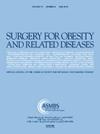The relationship of decision regret with quality of life and comfort level in patients undergoing laparoscopic sleeve gastrectomy: a cross-sectional study
IF 3.5
3区 医学
Q1 SURGERY
引用次数: 0
Abstract
Background
Laparoscopic sleeve gastrectomy (SG) is one of the effective methods of weight loss. It is essential to determine patients' regret and predictive factors to improve their quality of life and comfort. No study has investigated decision regret and affecting factors in patients undergoing SG in Turkey.
Objectives
The study aimed to determine the relationship of decision regret with quality of life and comfort level in patients undergoing SG.
Setting
The research was carried out with patients who had undergone SG in a private hospital in the west of Turkey.
Methods
The research was conducted as a descriptive, correlational, and cross-sectional study. Data were collected between March and May 2023, and the study was completed with 286 patients. Data were collected using the Personal Information Form, Decision Regret Scale (DRS), Quality of Life Following Obesity Surgery Scale (QoL-OS), and Comfort Scale.
Results
Patients’ mean score on the DRS was 5.27 ± 13.41 (0-100), the total mean score on the QoL-OS-Biopsychosocial dimension was 79.57 ± 9.35 (18-90), the mean score on the QoL-OS-Complications dimension was 17.17 ± 4.60 (7-35), and the environmental comfort score average was 8.87 ± 2.23 (0-10). Patients’ decision regret was significantly affected by the QoL-OS-Biopsychosocial Area dimension in the first place (Beta = −.516; P < .001), social comfort in the second place (Beta = −.278; P < .001), postoperative weight gain in the third place (Beta = .221; P < .001), and complication development in the fourth place (Beta = .163; P < .001).
Conclusions
The study revealed that patients’ decision regret levels were very low up to 3 years after surgery and found that low postoperative quality of life and social comfort level, postoperative weight gain, and complications affected decision regret.
腹腔镜袖状胃切除术患者决策后悔与生活质量和舒适度的关系:一项横断面研究。
背景:腹腔镜袖带胃切除术(SG)是有效的减肥方法之一。为提高患者的生活质量和舒适度,确定患者的后悔程度和预测因素至关重要。在土耳其,还没有研究对接受袖带胃切除术的患者的后悔决定及其影响因素进行调查:该研究旨在确定接受胃肠切除术的患者的决策后悔与生活质量和舒适度之间的关系:研究对象为在土耳其西部一家私立医院接受 SG 手术的患者:研究以描述性、相关性和横断面研究的形式进行。数据收集时间为 2023 年 3 月至 5 月,共有 286 名患者完成了研究。数据收集使用了个人信息表、决定后悔量表(DRS)、肥胖手术后生活质量量表(QoL-OS)和舒适量表:患者在 DRS 上的平均得分为 5.27 ± 13.41(0-100)分,QoL-OS-生物心理社会维度的总平均得分为 79.57 ± 9.35(18-90)分,QoL-OS-并发症维度的平均得分为 17.17 ± 4.60(7-35)分,环境舒适度的平均得分为 8.87 ± 2.23(0-10)分。QoL-OS-Biopsychosocial Area维度对患者决策后悔度的影响明显,排在第一位(Beta = -.516; P < .001),社会舒适度排在第二位(Beta = -.278; P < .001),术后体重增加排在第三位(Beta = .221; P < .001),并发症发展排在第四位(Beta = .163; P < .001):研究显示,患者在术后3年内的决策后悔程度很低,并发现术后生活质量和社会舒适度低、术后体重增加和并发症影响了决策后悔程度。
本文章由计算机程序翻译,如有差异,请以英文原文为准。
求助全文
约1分钟内获得全文
求助全文
来源期刊
CiteScore
6.70
自引率
12.90%
发文量
570
审稿时长
56 days
期刊介绍:
Surgery for Obesity and Related Diseases (SOARD), The Official Journal of the American Society for Metabolic and Bariatric Surgery (ASMBS) and the Brazilian Society for Bariatric Surgery, is an international journal devoted to the publication of peer-reviewed manuscripts of the highest quality with objective data regarding techniques for the treatment of severe obesity. Articles document the effects of surgically induced weight loss on obesity physiological, psychiatric and social co-morbidities.

 求助内容:
求助内容: 应助结果提醒方式:
应助结果提醒方式:


